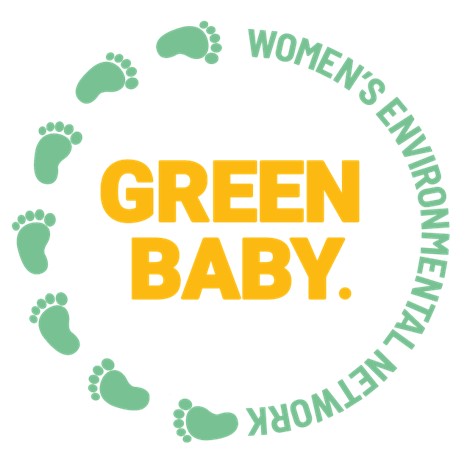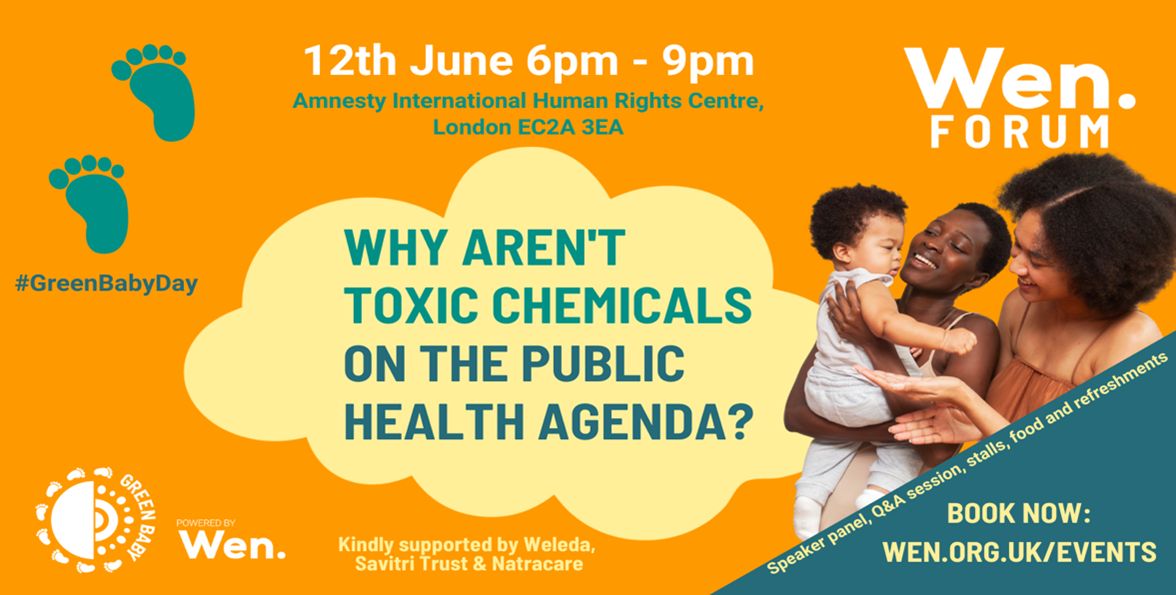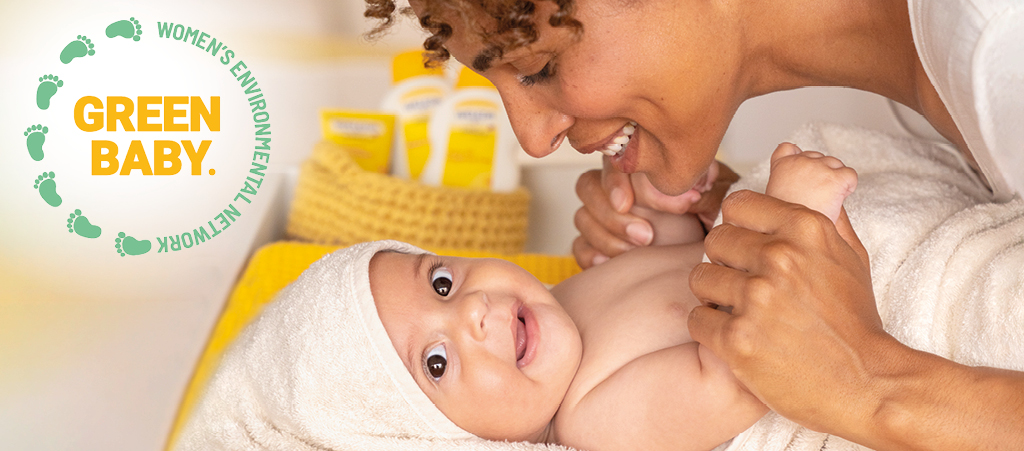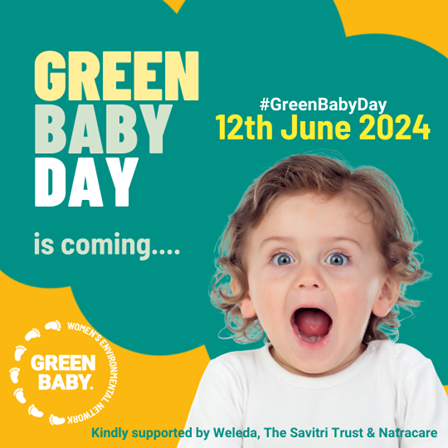Calling for a toxic free free future for our children
Green Baby Day
12th June 2024
Wen, the Women’s Environmental Network, is calling for a sustainable and toxic free future for babies and children on Green Baby Day, 12 June 2024.
The Green Baby survey from Wen shows parents are concerned about toxic chemicals in baby
 products with 9 out of 10 (90%) concerned or very concerned they can harm health. Respondents thought harmful chemicals in baby products should be banned (89%) or assumed they had been already (11%), with over three quarters (77%) thinking the UK government is not doing enough to protect us from harmful chemicals. The vast majority (95%) of the respondents to the online survey thought we have a right to a toxic free future and exposure to toxic chemicals, air pollution and the impacts of climate change are top concerns in relation to babies and children’s health.
products with 9 out of 10 (90%) concerned or very concerned they can harm health. Respondents thought harmful chemicals in baby products should be banned (89%) or assumed they had been already (11%), with over three quarters (77%) thinking the UK government is not doing enough to protect us from harmful chemicals. The vast majority (95%) of the respondents to the online survey thought we have a right to a toxic free future and exposure to toxic chemicals, air pollution and the impacts of climate change are top concerns in relation to babies and children’s health.This is the second year of Wen’s Green Baby campaign, and the focus for Green Baby Day 2024 is toxic chemicals, especially those present in baby products. The campaign is calling for toxic chemicals to be on the public health agenda, while also ensuring governments and companies safeguard our health and that of future generations.
Green Baby Day, supported by Weleda, empowers parents and carers to make healthy, eco-friendly and affordable choices to minimise exposure to toxic chemicals, and focuses attention on the need to ensure effective chemicals regulation to protect current and future generations, especially post Brexit.
A review of UK Chemicals regulations three years post Brexit reveals the UK is virtually at a standstill when it comes to banning and regulating toxic chemicals. In some areas the UK has gone backwards (1). Meaning EU citizens are better protected than in Britain. Wen and Weleda believe we deserve better.
Wen’s Expert Health Advisor Helen Lynn commented:
“We are sleepwalking into the next health emergency, with the government and business ignoring the clear link between exposure to toxic chemicals and adverse health impacts for babies and children. The developing foetus is particularly sensitive to even minute levels of certain chemicals that can cause cancers, birth defects and reduce fertility. The UK now lags behind in regulation of toxic chemicals and so it is key that we lobby our governments and policy makers to make the right decisions to keep us safe."
There are tens of thousands of chemicals in regular commercial use, many with little health and safety information, with the potential to harm health, fertility, the health of children and future generations. Children are particularly vulnerable, but to the developing foetus even small exposures can have serious and lifelong health consequences especially at specific times during pregnancy.
Jayn Sterland, Managing Director of Weleda UK, added:
“Of particular concern to Weleda, as a pregnancy and baby skin care manufacturer, are the Endocrine Disrupting Chemicals (EDCs) found in personal care products, which have the potential not only to negatively impact our own hormones (for example thyroid health) but that of future generations (2). For example the EDC triclosan can still be found in some antibacterial washes and oral care products – exposure during pregnancy is of particular concern as it has been shown to cross the placenta.” (3)
References:
(1) ChemTrust. Review of UK REACH 3 years on. Feb 2024
(2) Ana Marques, Melissa Mariana, Elisa Cairrao. International Journal of Molecular Sciences, October 2022. Triclosan and Its Consequences on the Reproductive, Cardiovascular and Thyroid Levels. https://www.ncbi.nlm.nih.gov/pmc/articles/PMC9570035/
(3) Environmental Health Perspectives. 2008 March; 116(3): 3037. https://ehp.niehs.nih.gov/doi/10.1289/ehp.10768
The awareness day will be marked by a discussion panel asking ‘Why aren’t toxic chemicals on the public health agenda?’, taking place at 6pm on 12 June at Amnesty International in London. High-profile speakers include obstetrician and Scientific Advisor to Global Black Maternal Health and Tommy’s Charity, Dr Karen Joash, Green Party peer Baroness Natalie Bennett, Seyi Falodun-Liburd from We Level Up, Susanne Astic, Policy and Advocacy Advisor on Children’s Rights and Chemicals, CRIN. The panel will be chaired by Wen’s Expert Health Advisor Helen Lynn. The event will include a Q&A session stalls, food and refreshments, and tickets are available at wen.org.uk/events

Why Green Baby?
Exposure to toxic chemicals and pesticides is a feature of everyday lives in our homes, workplaces and in the wider environment. There are tens of thousands of chemicals in regular commercial use, many with little health and safety information, with the potential to harm our health, our fertility, the health of our children and future generations. Children are particularly vulnerable, but to the developing foetus even small exposures can have serious lifelong health consequences especially at specific times of the pregnancy.
Prebirth or early life exposure to certain chemicals has been linked to a range of diseases including cancer, birth defects, fertility, developmental, neurological, and immune disorders. (4) Harmful chemicals can adversely impact our respiratory, reproductive, cardiovascular and urinary systems, and disrupt our endocrine system (our body’s network of hormone producing organs and glands, controlling all our vital functions - from growth and development, to metabolism and reproduction).
These chemicals and even microplastics from consumer products have a nasty habit of ending up where they shouldn’t. Recent examples include microplastic in baby poo (5) and 109 toxic chemicals such as flame retardants, cosmetics ingredients, and plasticisers found in maternal and umbilical cord blood, including 55 that had never been found in people before. (6)
Hormone-disrupting chemicals such as Bisphenols have been found in 60% of 121 children’s products tested including baby blankets, baby bottles or sipping cups, and teething toys. (7) And ‘forever chemicals’ such as PFAS can affect foetal and maternal health.(8)
(4) The Endocrine Society. Hormones and EDCs, what you need to know. 24 January 2022.
(5) Zhang, J et al. Occurrence of Polyethylene Terephthalate and Polycarbonate Microplastics in Infant and Adult Feces. Environmental Science & Technology Letters 2021 8 (11), 989-994.
(6) Wang, A et al. Suspect Screening, Prioritization, and Confirmation of Environmental Chemicals in Maternal-Newborn Pairs from San Francisco. Environmental Science & Technology 2021 55 (8), 5037-5049
(7) S Muller. Hormone-disrupting chemicals found in 60% of 121 children’s products. BEUC. 31 May 2023. https://www.beuc.eu/blog/hormone-disrupting-chemicals-found-in-60-of-121-childrens-products/
(8) Statement from Figo: FIGO calls for removal of PFAS from global use. 25th May 2021.
https://www.figo.org/figo-calls-removal-pfas-global-use
It has also become increasingly difficult to conceive initially with sperm counts more than halved in the last 40 years - a decline of 60% since 1973. Women have experienced a significant increase in impaired fecundity [the ability to have children]; unfortunately, this is not restricted to older women, as the largest increase is among younger women. This has been linked to many of the harmful chemicals.
Did you know?
• A newborn baby’s skin is five times thinner than adult skin. The outermost layer or stratum corneum is 30% thinner and contains less lipids. This means baby skin is more permeable, so it absorbs substances from the outside more easily and allows moisture to escape more easily.
• In the first weeks of life, the skin’s protective pH and hydrolipid film is still forming along with the skin’s microbiome defense system. As a result, harsh synthetic ingredients can disrupt its development.
• A baby’s sweat glands are still developing during the first two years, and the sebaceous (oil) glands even longer. Since both glands play a key role in the formation of the skin’s protective acid mantle, baby skin is more susceptible to bacteria, sensitivity, and dryness.
Weleda’s Green Baby Tips
• Choose multi-tasking products like Weleda’s Calendula All Purpose Balm or Calendula Shampoo & Bodywash, so you are buying less, and exposing your newborn baby’s skin to fewer ingredients.
• Young babies don’t need a daily bath or hair wash. A simple top-and-tail wash will keep your newborn clean, saving water, and saving you money.
• Avoid harsh or synthetic detergents which may strip skin of its natural protective oils and disrupt the skin’s microbiome, leading to dryness and greater sensitivity and even eczema.
• Don’t use adult toiletries on your baby as they may include ingredients which are not suitable for baby skin care, such as the synthetic preservative MI (methylisothiazolinone) which is a known irritant.
• Look for a certification logo (such as NATRUE) on babycare to confirm products are genuinely natural or organic, for quality and purity and to avoid endocrine disrupting chemicals such as parabens or triclosan.
• Choose a nappy cream made with plant oils instead of mineral oils (petrolatum) as mineral oils/fossil fuels are not sustainable, nor are they ideal for cloth nappies as they can clog the fibres.
• Opt for baby skincare products that have packaging that you can recycle at home. Ideally packaging that is also made with recycled materials such as Weleda’s baby bottles.
(9) Levine, H. Temporal trends in sperm count: a systematic review and meta-regression analysis of samples collected globally. Human Reproduction Update, Volume 29, Issue 2, March-April 2023, Pages 157–176, https://doi.org/10.1093/humupd/dmac035
(10) The Guardian. Shanna Swan: 'Most couples may have to use assisted reproduction by 2045'. Interview with Shanna Swan. 28/3/21
(11) ChemTrust. Review of UK REACH 3 years on. Feb 2024.


